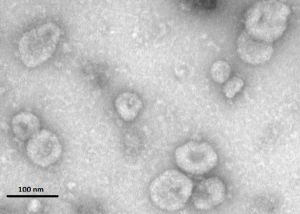En los últimos años se ha observado que todas las células del cuerpo pueden generar estas vesículas y se detectan en fluidos biológicos, como sangre y orina. “Este método se centra en analizar vesículas extracelulares que desempeñan un papel fundamental en la comunicación y el transporte de sustancias entre diferentes componentes del organismo. Su estudio se considera clave para identificar y validar nuevos biomarcadores (moléculas marcadoras de patología, como por ejemplo el colesterol) en la clínica”, explica la directora del proyecto, la investigadora Mar Valés, del Centro Nacional de Biotecnología.
“El desarrollo de esta técnica abre el camino, por tanto, a la búsqueda de nuevas dianas en biopsia líquida para el diagnóstico, pronóstico o monitorización de los pacientes encaminado a una mejor selección de la terapia adecuada para cada paciente. Al utilizar los mismos equipos que se usan en los hospitales para los análisis de sangre, nuestro esfuerzo va dirigido a hacer realidad una medicina personalizada asequible”, señala la doctora Valés.
“Con el nuevo método conseguimos caracterizar las nanovesículas a partir de cantidades muy pequeñas de fluidos corporales, sin necesidad de un procesamiento especial, aumentando la eficiencia del proceso y la sensibilidad de la detección”, añade la doctora Valés.
Hasta ahora, los métodos para poder determinar la identidad de los componentes en las nanovesículas eran lentos, requerían maquinaria y personal científico especializado, y necesitaban un gran volumen de muestra. Además, hacía falta un procesamiento complejo, previo al análisis de las muestras y, en muchos casos, no era fácil distinguir los elementos contaminantes aislados simultáneamente.
Ahora, el nuevo método descrito por Valés y colaboradores selecciona las vesículas y las separa del resto de componentes permitiendo obtener información de muestras de orina utilizando un volumen más de diez veces inferior al requerido con las técnicas actuales.
El trabajo ha sido liderado por investigadores del Centro Nacional de Biotecnología del CSIC, en colaboración con científicos de la Universidad Autónoma de Madrid, especialistas del Hospital Universitario La Paz y la empresa española Immunostep, S.L.
Importancia de las vesículas extracelulares
La composición de las vesículas extracelulares varía en respuesta a situaciones patológicas, siendo distintas las vesículas procedentes de células sanas de aquéllas que sufren algún cambio, por ejemplo, una infección o una transformación tumoral. Estas características de las vesículas extracelulares hacen que se empiecen a considerar como herramientas para el diagnóstico de enfermedades y muchos investigadores las incluyen en el término de biopsia líquida, introducido en la clínica en los últimos años para referirse a una alternativa no invasiva a la biopsia quirúrgica o convencional. De esta manera, con un simple análisis de sangre u orina se podría obtener información de un tumor.
El reto actual de los investigadores es obtener un sistema de análisis cualitativo y estándar que se pueda utilizar en los distintos laboratorios y hospitales.
Carmen Campos-Silva, Henar Suárez, Ricardo Jara-Acevedo, Estefanía Linares-Espinós, Luis Martinez-Piñeiro, María Yáñez-Mó & Mar Valés-Gómez. High sensitivity detection of extracellular vesicles immune- captured from urine by conventional flow cytometry. Scientific Reports






